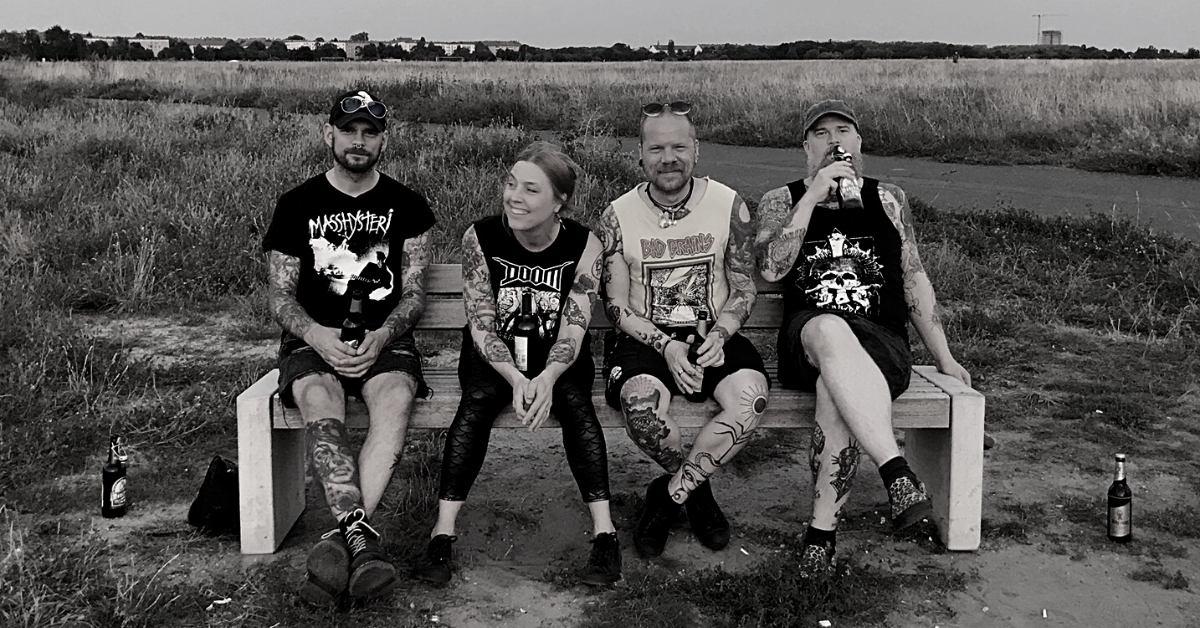
Śmierć is a hardcore punk band from Stockholm whose name means ‘death’ in Polish. The band features ex-members of bands such as Idiot Ikon, Imperial Leather and Abductee SD, but their sound is very different from anything they’ve done before. At least when it comes to the lyrics, as Śmierć sing most of their songs in Polish.
Their first album, ‘Godzina Pusta’, was released in 2018 and pays homage to cult Polish bands such as Dezerter, Post Regiment, Homomilitia, the poetry of Wisława Szymborska or the singer-poet Ewa Demarczyk. On their second release, 2021 ‘Paranoja’, the band have already managed to create their own unique style, mixing traditional Swedish d-beat with lots of melody and beautiful poetic vocals. They even included some lines sung in Swedish. In November 2022, the band also released their amazing single ‘Prawda’, which tackles the rise of the far-right and Neo-Nazi extremism in their country. Now the band is still going strong and I can’t wait to hear what’s next for this amazing band!
The following interview appeared in in the fourth issue of the Bulgarian punk & sci-fi fanzine ‘Svetlo Budeshte’, which is now almost sold out.
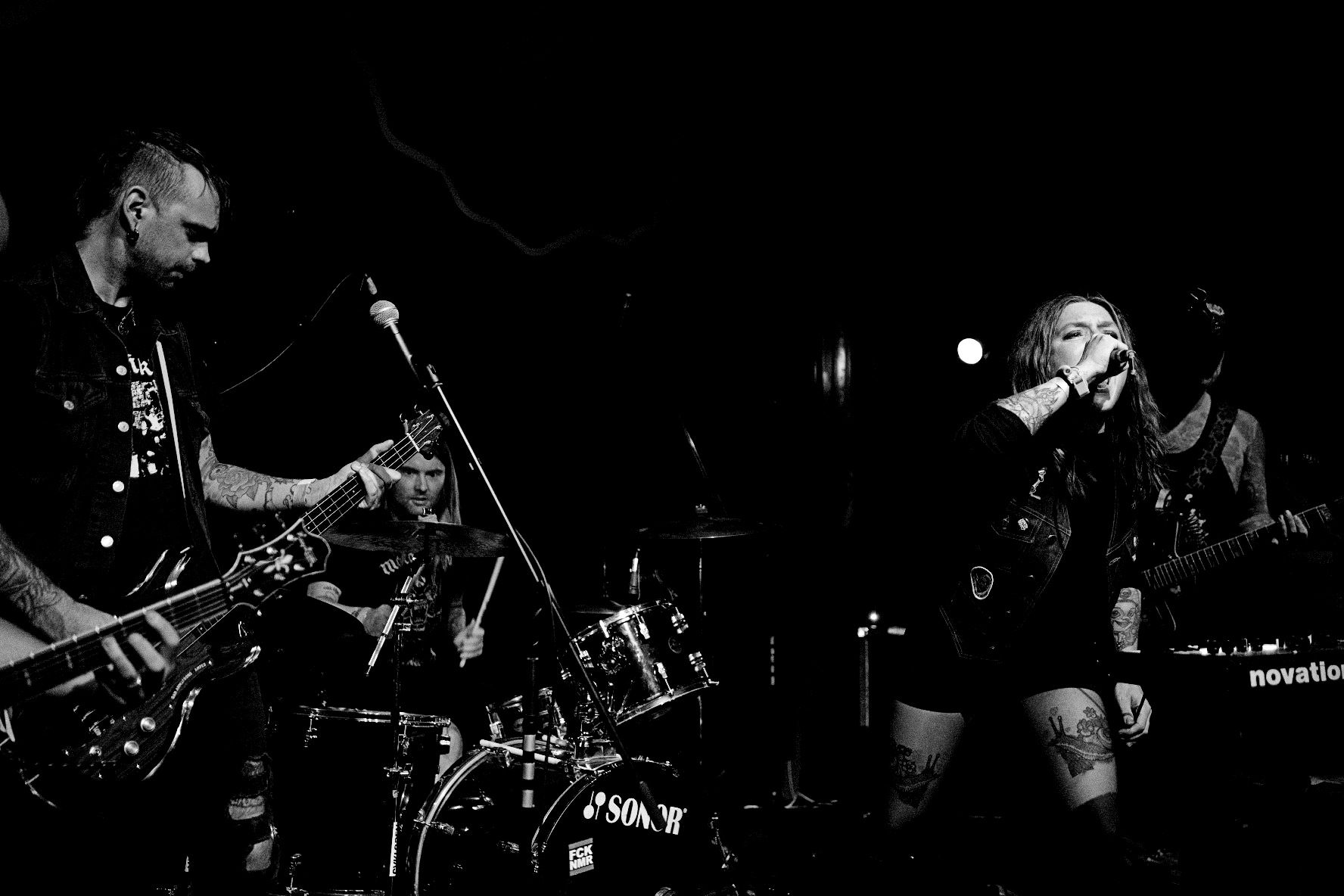
When did you start Śmierć and what was the impetus to form the band? Is anyone else in the band besides the singer Ninka speaking Polish?
Krisse: Sumo and Calle played together in Idiot Ikon, but wanted to do something different musically, so they talked to me and I was happy to join. Soon after, Ninka joined on vocals and we started playing together in the spring of 2017. And no, nobody but Ninka speaks or understands Polish.
Ninka: We have all played in various bands since the ’90s (or early ’00s if you are a sweet kid like Calle) and at that time I had not been in a band for a few years. When I was asked to join, I wanted to bring something new to the table. I knew how to sing in Swedish and English, but I had never tried my creativity in Polish. I soon realised that my voice was different in Polish, my attack was different. So we explored it further. On a personal level it was a trip into the past, going back to my many years in the ’90s when I studied Polish in Poland as a student, as a punk in a country that had just gone through years of totalitarian rule and I was reliving years that were very formative for me. But really, my Polish sucks and I am so grateful that people have not been mean to me about it.
How did you get into Eastern European punk and what brought your interest to Poland more specifically? What was your opinion on the political system in Eastern Europe as people growing up in the ‘80s?
Krisse: For me the Polish punk scene in the ’90s offered something completely unique! I was (and still am) very fascinated by the sound of quite brutal music combined with beautiful melodies that didn’t sound like the Swedish “trallpunk” that was really big at the same time.
Ninka: For me it was everything. The unique sound, the phrasing, the social perspective of the lyrics. I first went to Poland in 1990. As a young girl I was overwhelmed by the hospitality and curiosity of the people I met. I visited the country as often as I could and started to learn the language. After a few years I met some punks by contacting the people who had their addresses on tapes. I started to find my way to the shows and met more people. I tried to get my hands on as much music as I could and by the end of the ’90s I think I was going to 2-3 shows a week. We would take whatever rickety trains we could find to get to the shows.
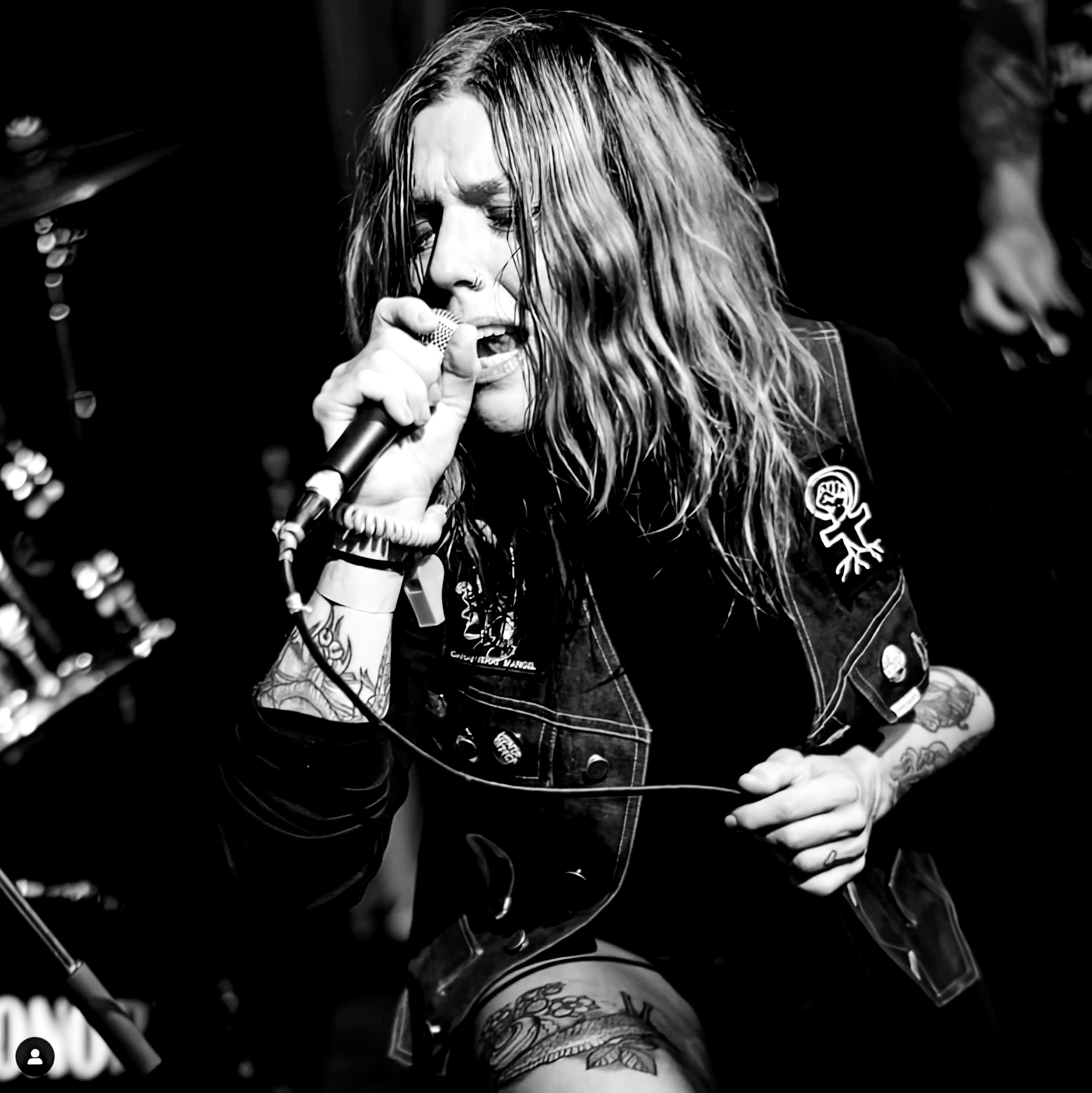
In your first record ‘Godzina Pusta’ you mixed various music influences and lyrics taken straight up from the songs of punk bands like Dezerter, Post Regiment and Homomilitia, plus the poetry of Wisława Szymborska and singer Ewa Maria Demarczyk. Wondering if you could highlight your favorite albums, songs or poems from Poland and how they continue to influence things until today?
Krisse: Musically, I think it’s just a big mashup of the music I like and what just comes out when I pick up the guitar. There was no intention on my part to try and sound like any particular band or style of music.
Ninka: I chose these bands and lyrics because they are iconic to me. The Dezerter album ‘Underground out of Poland’ gave us both lyrics to “Atleta” and the whistle in “Oda”, but the Ewa Demarczyk song “Grande Valse Brillante” also gave me the possibility to express lament after a divorce in that same “Atleta”. The intensity in the music played by Post Regiment and Homomilitia are universal and ageless. The frustration, the grief, the pain and the euforia are in the beats, in the guitar riffs and applicable to the people who need it, when they need it. These are often considered to be the scattered feelings of a young person, but for me they are still within me. Valid and best expressed through the music we create. Just take the Dezerter song “Musisz być kimś” (chuck it in Google translate and you’ll get the gist of it) for example. Those are lyrics that can touch any teenager in Sweden today struggling with the demands of a society that forces them to think about how to perfect themselves instead of hanging out with friends and peers to make great things for more people.
I’m sure many people outside of Sweden thought you were a real Polish band after listening to the record. Can you talk about the feedback you’ve received since releasing the album and how you came up to collaborate with the legendary label Nikt Nic Nie Wie?
Krisse: Yes! I just saw a review of our second album in a fanzine yesterday that said we were a Polish band! Haha. And I think it was the review in Sanctus Propaganda that said that the reviewer didn’t really like it at first (when he thought we were Polish), but when he realised we were from Sweden it was a completely different thing! And I totally understand! It IS a different thing to borrow and pay tribute to great lyrics etc. in your own language than to do it in a language that is not even your second language.
I just sent the recording of our first album to some record labels that I liked and NNNW really liked it and wanted to release it. As this was our “dream label” we could hardly believe it but we are so grateful to the amazing Michel for supporting us all from the beginning!
Ninka: I was totally scared when we recorded it and I realised that people might not get it. That people might think we were stealing lyrics or trying to make fun of something that was sacred to me. Luckily I have only heard loving, kind words so far. And yes, as Krisse said. To be released on NNNW was a dream come true.
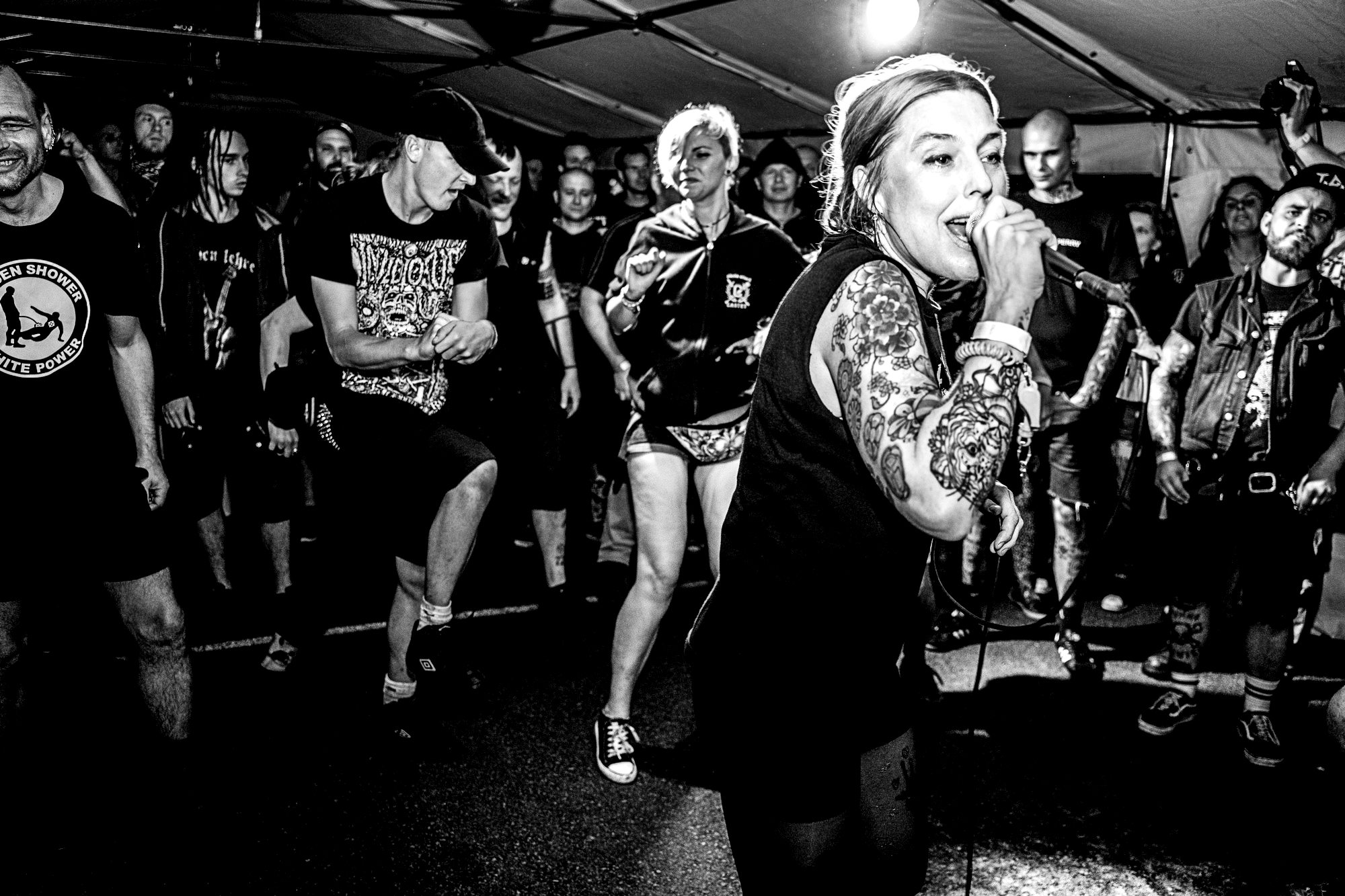
In what ways does the second album ‘Paranoja’ differ from your debut record? What influenced you writing the new songs? Is it possible for a band like Śmierć to keep innovating and not become stuck in the “paying homage to” label?
Krisse: I think we are starting to find our own sound more and I also like the mixing and overall sound of the second album more than the first. I also think that musically there’s very little “homage” left in the songs on ‘Paranoja’, at least not intentionally. The writing process was very slow on this album, mainly because of Corona, etc. I wrote the riffs long before we could actually put them together into finished songs, and also the recording process was complicated and had to be spread out over more than six months. I think the final result is surprisingly coherent, but I’m pretty sure that our next album will be a huge step forward for us as a band. The new songs we have in store are very promising!
Ninka: As this started as a dive into the past, I am very much swimming upwards now. ‘Godzina Pusta’ was just an outlet for things we wanted to try, ‘Paranoja’ is an extension of that but with more depth in the songs I think. I dared to try more things and we dared to be quietly emotional compared to the first album which was a bit more raw. Now working on the next album seems to be even closer to my creative core. I am enjoying the process so much!
With the Polish heritage, the Swedish d-beat in our DNA and the many years in the DIY punk scene, I have found my creativity as a middle-aged woman. I’d say what we’re writing now is very 2022. The lyrics are my own, a mixture of Swedish and Polish, and the music Krisse writes is beyond anything I have ever played before. There might even be English and Spanish as we go along, who knows? The writing process is so free and uninhibited. I really hope we get many hours in the rehearsal studio in the coming months.
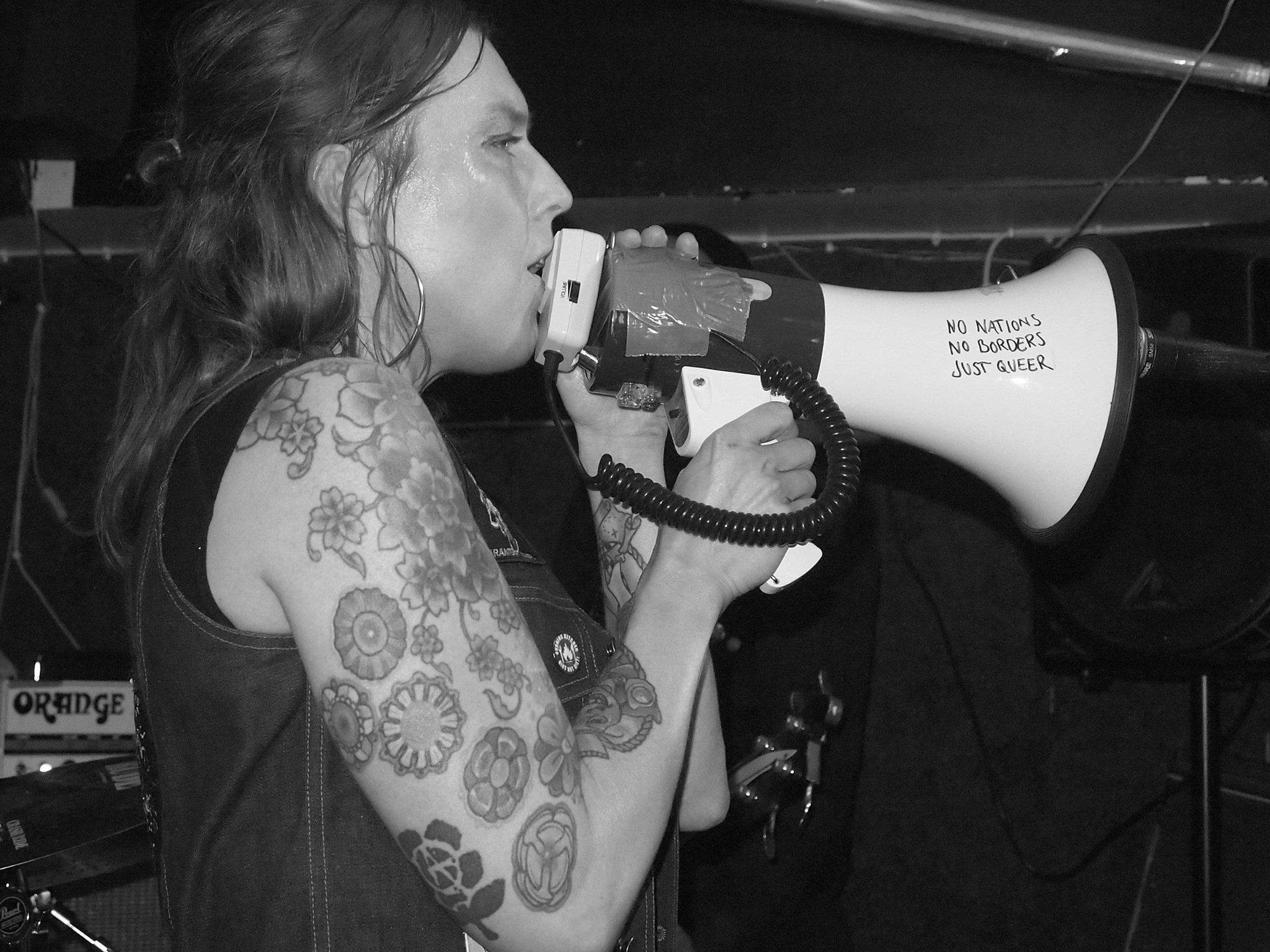
Do you have any other Polish influences, past and present, that are not necessarily connected to your music? For example, famous writers like Stanisław Lem or any modern day Polish literature, cinema, etc.?
Ninka: To be honest, I have little knowledge of Polish culture after 2005. I am embarrassed to say this, but it has to do with the fact that I got tired of the toxic atmosphere at shows in Poland at that time and I started having babies, which made me somewhat homebound. As far as music is concerned, we have not mentioned Siekiera, who I think all punks should check out. I must also mention the film director Andrzej Wajda and his film “Katyń” from 2007. For poetry I turn to Adam Zagajewski and Wisława Szymborska, but I am sure there are many, many more I should look up and highlight. Unfortunately, I do not have enough time to pursue all my passions. So, readers of this interview, fill me in!
You’ve been playing punk music for a long time in bands that might be considered political artists. Now, with Śmierć you’re mainly influenced by political punk bands and poetry coming from another country. Do you think your music is also a reflection on the current political situation in Poland? Is the war in Ukraine or the rise of the far-right in the recent elections in Sweden narrowing the gap between the two countries?
Ninka: I believe music always carries a beat of the present as well as of the past. We have not paid specific attention to Poland when writing the music, nor to Russian encroachments. What is always in our creative stream however is questioning the state of affairs. Justice, equality, human rights, animal rights are issues that are top of mind to us. As is taking care of children, relationships, losing family members – all of these things are there when you are making music. Naturally this is expressed in the sound, in the energy that flows out of us when we are in the same room.
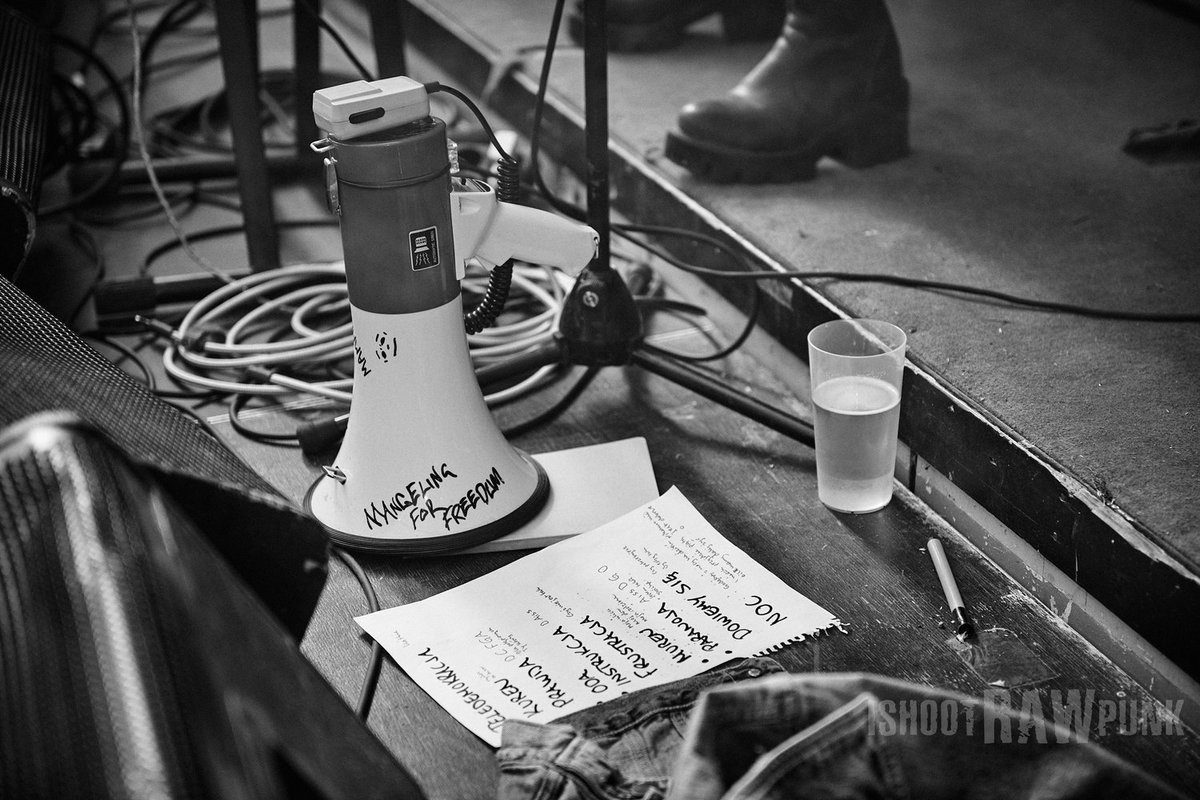
I’ve heard that sometimes you use a megaphone on stage. What are some artistic ways to make punk interesting, exciting and political again? Like mixing punk with electronic music, spoken word, poetry or whatever. Do you think that it’s still possible to come up with creative ideas the way Crass did 40 years ago?
Krisse: We’re using more and more electronic parts in our songs and we’re not going to stop! It opens up so many more possibilities musically and I love it. For me, Śmierć has always felt very free and without any rules about how we are “supposed” to sound. This is a big difference from my previous bands and in many ways a great relief. In this band I can use a lot of the weird stuff I come up with on the guitar and it just fits! For example, I didn’t know that a ¾ beat goes perfectly with a d-beat, but now I do! Haha. And for our next album I sampled my daughter’s toy piano, it has an amazingly eerie sound that I just love.
Ninka: I love this question because I want to explore different art forms within the Śmierć constellation. The megaphone is used live to gather people, to shout, to get people’s attention. To emphasise the time that we share in this moment of life. You know, Śmierć means death, and death at the end of the day is what makes life so intense. And the sound of the megaphone is cool and that can be enough as an explanation, haha. The electronic elements are really fun to explore! I would also like to incorporate more spoken word and physical art into the shows. But I’m also cringe sensitive and I love my good old punk stuff, so we’ll see where we end up. Thank you so much for contacting us and taking an interest in our music. Lots of love!
Follow Śmierć on Bandcamp, Facebook, Instagram, and YouTube.
